Rugby World Cup 2023: Michael Hooper, Quade Cooper’s Wallabies careers come to a sad end
As ruthless as ever, Wallabies coach Eddie Jones has swung the axe – and ended the careers of two Australian champions. In both cases, it is a sad end, writes Jamie Pandaram.
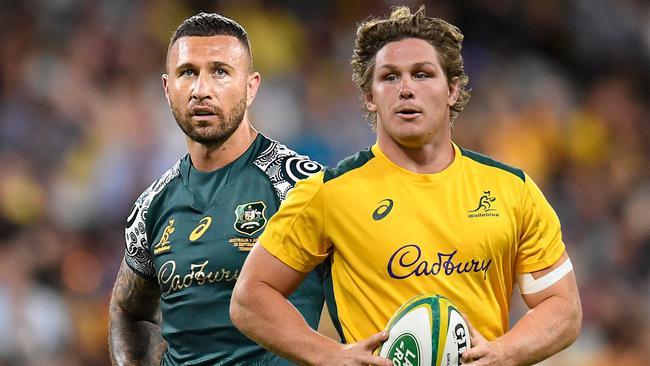
Wallabies
Don't miss out on the headlines from Wallabies. Followed categories will be added to My News.
A knock-on and a calf injury have likely ended the Test careers of two of Australia’s most maligned rugby stars.
Quade Cooper and Michael Hooper are both shock omissions from Eddie Jones’ 33-man World Cup squad heading to France.
If Cooper never plays for the Wallabies again, his last act in the gold jersey will have been knocking the ball on in Dunedin, giving the All Blacks a scrum in the final minutes, from which they won a penalty and kicked the winning goal.
Cooper’s detractors will say it’s a fitting end.
The 35-year-old has divided opinion in Australia for more than a decade with his outlandishly brilliant skill that also reaped rocks-or-diamonds results.
His knee to Richie McCaw all those years ago still hasn’t been forgiven in certain sections of New Zealand, with Cooper booed at Forsyth Barr Stadium last weekend when he touched the ball.
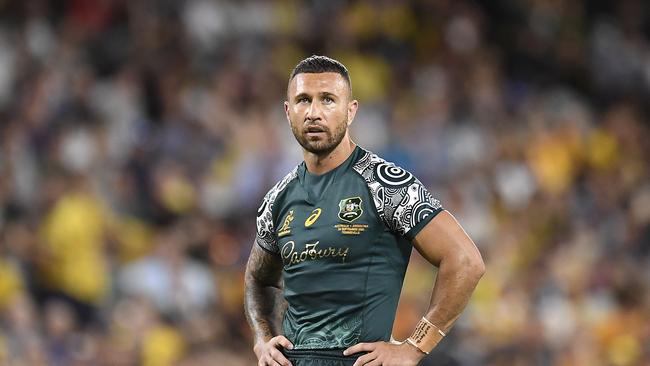
But Cooper still has one of the best win percentages (63.3%) of any bonafide Wallabies five-eighth in history, only behind Michael Lynagh (71.52%) and Stephen Larkham (68.13%).
Jones spoke of Cooper’s maturity and leadership capabilities when he held his first camp earlier this year, and it appeared the wily playmaker was set for the World Cup when he started the opening two Rugby Championship games and came off the bench for the two Bledisloe Cup matches.
Instead, Jones has dumped him altogether, naming only Carter Gordon as his five-eighth in the squad, with Ben Donaldson in a utility role to back him up.
Not only that, Jones is taking James O’Connor – who hasn’t featured in any of his squads through TRC – as a back-up trainer for their coming Darwin camp.
That suggests if Gordon or Donaldson are injured during the World Cup, Jones will look to call on O’Connor instead of Cooper.
Meanwhile, the sad end to Hooper’s glittering Test career has come without a home farewell.
Hooper has been left out of Eddie Jones’, meaning his last match against South Africa in Pretoria was his final outing.
Hooper played 125 games for the Wallabies, while Cooper has played 80.
Hooper is behind only George Gregan (139 caps), James Slipper (130 *still playing) and Stephen Moore (129).
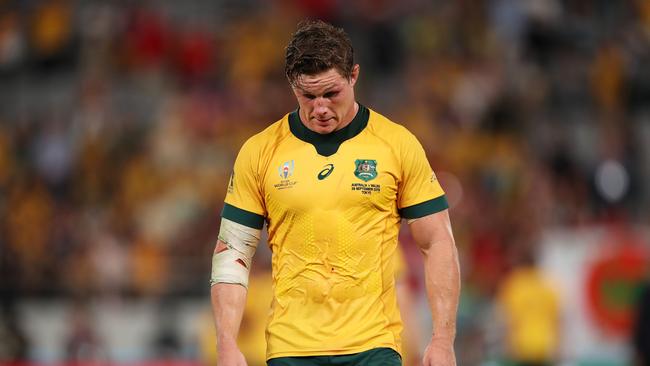
To rack up so many international matches in the demanding backrow position, and put out consistently excellent performances at an incredibly high level will be Hooper’s giant legacy.
The 31-year-old still hasn’t made a decision on what his future looks like.
This could well be the end, he may decide to hang up the boots entirely.
Chasing gold at the Paris Olympics next year has also been floated as an idea.
What is clear is that unless there are a raft of injuries and Hooper’s calf miraculously heals quickly, he has pulled on the gold jersey for the final time.
And his body may no longer be up to the rigours of a gruelling Sevens program that requires constant travel.
Hooper led the NSW Waratahs to their only Super Rugby title in 2014.
He has been an admired leader within the Tahs and Wallabies set-up for a decade and commands the respect of the game’s best players.
In recent years, he has come under immense scrutiny as the Wallabies performances dipped to all-time low results, and he bore the brunt as captain.
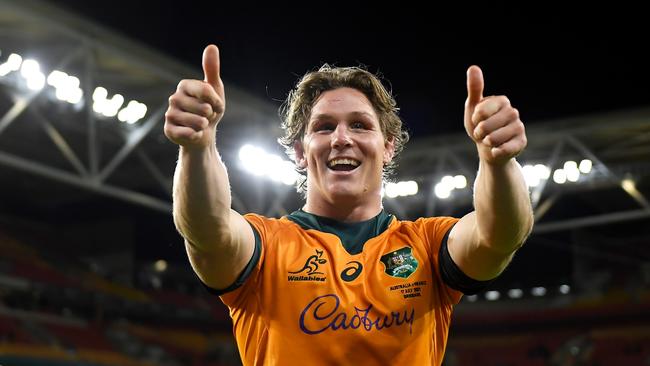
In the end, the heavy responsibilities and criticism took its toll, as Hooper stepped down from the Wallabies squad before The Rugby Championship last year due to mental fatigue.
He took the time out to look after himself, returned for NSW during Super Rugby Pacific, and impressed Jones so much that he and James Slipper were named co-captains of the first Wallabies team that took on South Africa in Pretoria.
It was after that match that news emerged of Hooper’s calf injury.
It was thought he’d recover in time for the Bledisloe Cup but that didn’t transpire, and after Fraser McReight performed incredibly well in the second match against Dunedin, it became clear Jones had the No.7 he needs for a Cup campaign.
While he failed to win the Bledisloe or World Cup in his time as Wallabies captain, he did manage to claim the 2015 Rugby Championship, and led Australia to several important wins over England, Wales and the Springboks.
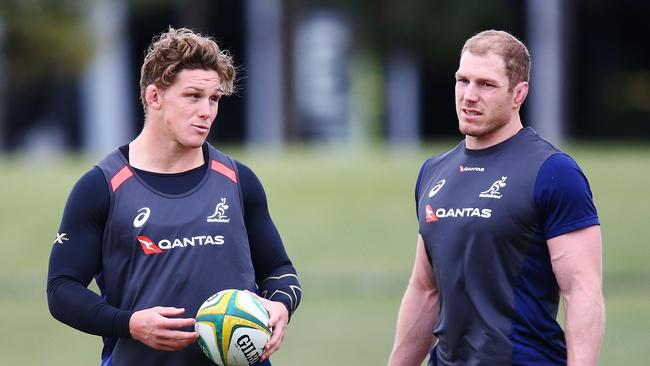
His career will go down as one of the all-time greats here and abroad.
Hooper burst onto the scene at the time David Pocock seemed to have a mortgage on the No.7 jersey.
But such was his talent, Hooper forced coaches to play Pocock at No.8 on several occasions so they could squeeze both openside flankers into their starting teams.
Hooper came to Sydney from the Brumbies as a quietly-spoken prodigy, but as his actions spoke volumes on the pitch he began to find his voice in public too.
He was a key figure in the ugly Israel Folau saga in 2019, as the NSW and Wallabies captain, and spoke of the importance of rugby’s inclusivity at a time the game needed to convey that important message.
Hooper bows out among the top crop of incredible No.7s produced by the Wallabies including Poock, George Smith, Phil Waugh, David Wilson, Willie Ofahengaue and Simon Poidevin.
More Coverage
Originally published as Rugby World Cup 2023: Michael Hooper, Quade Cooper’s Wallabies careers come to a sad end



